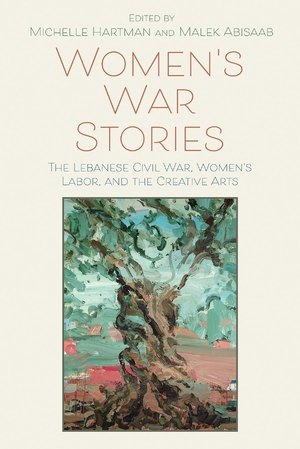"Women’s War Stories is destined to become a required textbook in history; Middle East, war, and gender studies; and postcolonial and cultural studies."—Arab Studies Quarterly
"Every essay attests to women’s creative and practical initiatives during a reign of terror and brings the reader to Lebanon’s vibrant contemporary art scene."—Al Jadid
"This powerful collection of essays centers the lived experiences of women trapped in the vise of violence and war. Their narratives remind us of the power of art and remembering in healing wounds from the past. Such stories, rendered gracefully here, allow us to imagine a better future. The editors and contributors have done a masterful job of restoring the voices of those ignored, excluded, and erased, to give us a deeper understanding of a time that many would simply like to forget. But in forgetting, they risk the peril of repeating."—Beth Baron, City University of New York
"Some 30 years after the Civil War, women laborers, domestic workers, rappers, graffiti artists, film-makers and others, have boldly contributed to the herstory of unfolding Lebanon. Hartman and Abisaab have anticipated the importance of these vital narratives, buried for decades, and have created a compelling book that not only uncovers the truths about Lebanon’s past but sheds light on the Lebanon of today."—Elise Salem, Lebanese American University
"A masterfully curated collection of displaced cultural and social histories of women's labor, experiences and imagination in Lebanon. Women’s War Stories demonstrates the history of the Lebanese civil war must center on gender."—Stephen Sheehi, author of Camera Palaestina: Photography and Displaced Histories of Palestine
"This book provides a fresh and largely unique perspective of how the 'civil war' between 1975 and 1990 impacted several women artists and activists."—Malek Khouri, The American University in Cairo
"Women’s War Stories offers unheard and sometimes private stories of those who have experienced the Lebanese civil war. The feminist angle is important not only for the focus on women’s lives but as a framework of analysis that underscores the ethical/epistemological limits as well as the possibilities borne out of story-making."—Dina Georgis, University of Toronto
Description
Women have consistently been left out of the official writing of Lebanese history, and nowhere is this more obvious than in writing on the Lebanese Civil War. As more and more histories of the war begin to circulate, few include any in-depth discussion of the multiple roles women played in wartime Lebanon. Fewer still address the essential issues of women’s work and their creative production, such as literature, performance art, and filmmaking.
Developed out of a larger oral history project collecting and archiving the ways in which women narrated their experiences of the Lebanese Civil War, this book focuses on a wide range of subjects, all framed as women telling their “war stories.” Each of the six chapters centers on women who worked or created art during the war, revealing, in their own words, the challenges, struggles, and resistance they faced during this tumultuous period of Lebanese history.
About the Author
Michelle Hartman is professor of Arabic literature at McGill University. She is the author of Breaking Broken English: Black-Arab Literary Solidarities and the Politics of Language.
Malek Abisaab is professor of history at McGill University. He is the author of Militant Women of a Fragile Nation.
6 x 9, 232 pages, 8 color illustrations
October 2022




